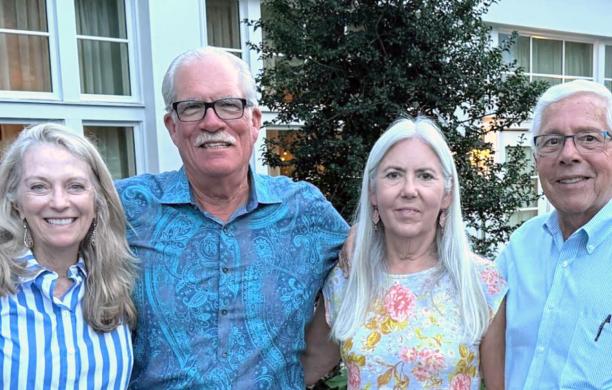In 1985, as part of a class at Lehigh, Stu Seltzer ’87 took a tour of the Mack Truck offices. Little did he know then that one day he’d hop in the cab of a freshly assembled heavy-duty truck and drive it out onto the test track.

Today, Seltzer is partnering with Mack as it celebrates its 125th anniversary by doing what he does best: generating new revenue by licensing well-known brands.
If you don’t know his name, you certainly know his work.
Seltzer is the force behind iconic products like Elmo-shaped pasta, Dunder Mifflin-branded copy paper, and SpongeBob Popsicles — the world’s top-selling frozen treat on a stick.
As president of Seltzer Licensing Group, a 25-year-old company with offices in New York City and Los Angeles, Seltzer has become a licensing guru. His clients include industry giants like Unilever, Zippo, Campbell Soup, the National Parks Foundation, NBC, Scotts Miracle-Gro, and the American Red Cross. This December, he’ll be inducted into the Licensing International Hall of Fame.
A Historic Opportunity
Seltzer’s journey into licensing is as unconventional as it is inspiring. It began with a front-page story in The Wall Street Journal — an early success that came about thanks to, of all things, the Berlin Wall.

After receiving his accounting degree from Lehigh, Seltzer joined Arthur Andersen, where he quickly earned his CPA. But in 1989, as the Berlin Wall came down, a unique opportunity fell into his lap. Seltzer and his wife asked a friend in Germany to send pieces of the wall in a shoebox. He packaged each piece in Plexiglass, added a certificate of authenticity from a Lehigh geology professor, and faxed a press release to New York media about selling “a piece of history.” The story gained traction, and media arrived on the first day of sales. The pieces sold out, and Seltzer soon found himself on The Charlie Rose Show.
Bloomingdale’s offered to buy 100 pieces if Seltzer would mention the store on the show. He did. Soon, 100-pound crates were arriving from Berlin, and Seltzer was regularly making trips to customs at JFK airport. Orders from Bloomingdale’s quickly grew from 100 pieces to 5,000. Macy’s wanted in on the action, too.
But then came a difficult conversation: Arthur Andersen, worried about liability, told him he’d have to stop selling the pieces or leave the firm. By then, he realized accounting wasn’t fulfilling his creativity. So he left.
That story — “There’s no accounting for people who take chances” — landed on the front page of the Wall Street Journal.
Taking chances became his signature.
It’s a trait he developed at Lehigh, where Seltzer ran for president of the Student Activity Council (now the Lehigh Senate) and was elected, overseeing campus-wide events and funding for campus groups. In February 1986, during the AIDS crisis, he wrote to Trojan to support International Condom Day at Lehigh.
A box of 1,000 condoms soon landed on his desk, followed by a meeting with campus leaders, including the chaplain. Though the event was ultimately canceled, Seltzer’s fraternity, Sigma Alpha Mu, distributed the condoms to students throughout the semester.
A Bold New Path
Leaving Arthur Andersen allowed Seltzer to pursue a new direction. Torn between law school and an MBA, he ultimately chose Columbia Business School. Afterward, he began working in licensing.

His first role was at Yves Saint Laurent managing 15 global licensing partners. Later, at Warner Brothers, he handled a share of the 450 partners for the Batman franchise. When asked to move to Los Angeles, Seltzer took another leap: He stayed in NYC and launched his own agency.
His first client? Chef Boyardee. That’s when Seltzer helped license in Barney and Spiderman for cans of character-shaped pasta.
Today, Seltzer works with clients like the American Red Cross, licensing its brand to products aligned with its mission: first aid kits, fire extinguishers, dog life jackets, and hand sanitizer. Scotts, another client, has more than 100 licensed products, including garden tools, hoses, gloves, and lawn mowers.
Giving Back to Lehigh
Beyond his clients, Seltzer has dedicated himself to teaching. For 21 years, he has taught at New York University, where he even won a prestigious teaching award in 2017. His course covers all facets of brand licensing, from fashion and art to food and entertainment.
In the fall of 2023 he brought this expertise to Lehigh and taught “Ventures in Brand Licensing” in the MBA program.
In his classes, Seltzer brings in friends, alumni, and parents from the industry. He is a familiar face in the field’s trade publications and chaired the Licensing Hall of Fame event for 11 years. His peers know him for his signature trade show seminars and recap videos.
Connections are Seltzer’s specialty. That seems to trace back to Lehigh and his family. His father, Stephen Seltzer ’58, studied accounting and transitioned into tax law, continuing to practice at age 87. His brother, Cliff Seltzer ’91, also majored in accounting and now runs an email marketing company.
While he first met his wife, Danielle Zimet Seltzer ’87, when he was 16 years old, they started to date during their junior year at Lehigh.
This December, Danielle and his family will proudly cheer him on as he’s inducted into the Licensing International Hall of Fame. While he is humbled to be recognized, he’s far from finished. There are more connections to make and chances to take.


